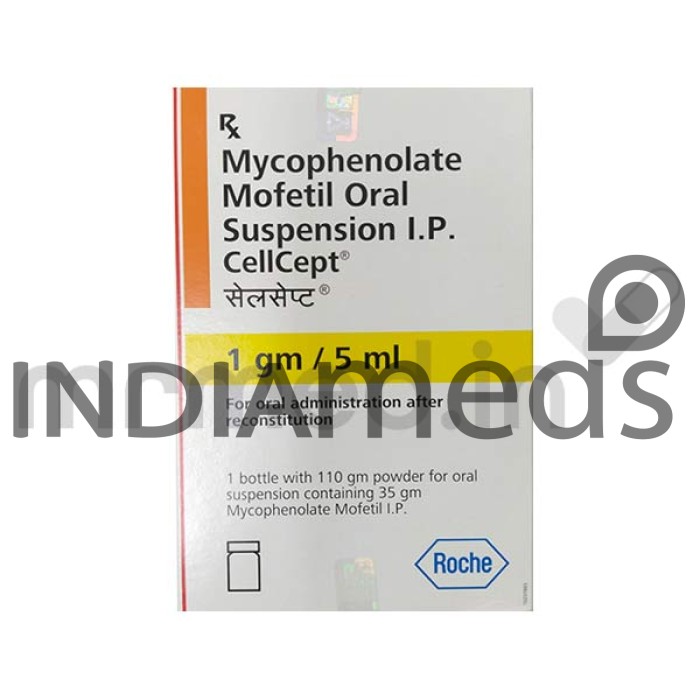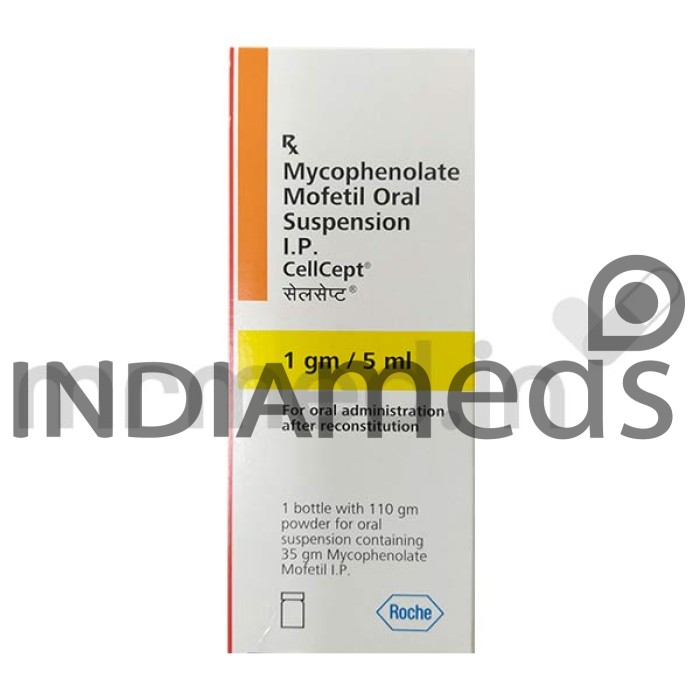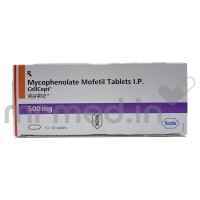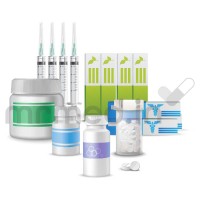Cellcept suspension is an immunosuppressant with an active ingredient called Mycophenolate mofetil. It belongs to the inosine monophosphate dehydrogenase (IMPDH) inhibitor category. This medicine is used to prevent organ rejection in individuals who have previously received an organ transplant (such as kidney, heart, or liver transplantation). It is prescribed as part of a combination therapy that includes other immunosuppressive drugs.
This drug is contraindicated during pregnancy due to the risk of birth defects and miscarriage. It should not be advised in pregnant women unless there are no relevant alternatives and the potential benefits outweigh the risks. Women of birthing age are highly advised to use effective contraception while taking this suspension to prevent pregnancy. Live vaccines should not be administered while a person is taking a Cellcept suspension due to reduced vaccine effectiveness and the risk of infection. Individuals taking this drug should not donate blood during treatment and at least six weeks after stopping treatment. It ensures that the medication has been adequately cleared from the body before donating blood.
It is generally advised not to take this medicine if you are allergic to the drug or any other ingredients. Inform your doctor of liver or heart disease before initiating the treatment. As this drug reduces the body's immune defenses, it can increase the chance of skin cancer. Individuals must take precautions to limit their exposure to sunlight and ultraviolet (UV) light. Seek your doctor immediately if you develop any bruising under the skin, fever, unexplained tiredness, dizziness, yellowing of the skin or eyes, vision impairment, reduced urine output, and seizures after taking this medicine. Cellcept suspension is an immunosuppressive medication. It may affect the infant's developing immune system and should be avoided in breastfeeding. In some cases, alternative medications with a more favorable safety profile during breastfeeding may be considered.
Therapeutic Effects of Cellcept Suspension
Pregnancy
Cellcept suspension is known to have harmful effects on the developing fetus and is generally not prescribed for use during pregnancy unless the benefits outweigh the risks.
Breast Feeding
Cellcept suspension is not recommended for breastfeeding mothers because small amounts of the drug can pass into the mother's milk and affect the nursing baby.
Lungs
Cellcept suspension should be cautiously administered in patients with lung diseases. Dose adjustments are necessary. Inform your physician if you have lung problems before initiating the therapy.
Liver
It is generally considered safe for individuals with liver disease, including those with liver transplants. The dosage and use of Cellcept suspension may need to be adjusted based on the severity of liver impairment.
Alcohol
It is unsafe to consume alcohol when taking Cellcept suspension because it may cause excessive drowsiness or liver problems.
Driving
Driving vehicles or operating machinery while taking Cellcept suspension is unsafe because it may cause drowsiness and vision problems.
Serious
- Infections, fever, or sore throat
- Unusual bleeding or bruising
- Low blood cell count
- Severe allergic reactions
Common
- Higher risk of developing lymphoma and other cancers
- Nausea, abdominal pain
- Diarrhea
- Constipation
- Loss of appetite
- Shortness of breath
- Weight loss
- Increased heartbeat
- Headache
- Blood pressure problem
- Anaemia
Breastfeeding is generally not recommended while taking Cellcept suspension. This drug can pass into the mother's breast milk and may hurt the nursing infant. Consult your doctor about breastfeeding if you are taking this suspension.
Cellcept suspension suppresses the immune system, preventing it from attacking the transplanted organ. It inhibits the activity of certain immune cells involved in the rejection process.
Stopping your treatment all of a sudden may cause your condition to become worse. Do not stop taking Cellcept suspension without consulting your doctor.
Follow the instructions advised by your doctor or the medication label. Cellcept suspension is taken orally with food to improve absorption. It should be swallowed, not chewed or broken.
It is highly recommended to limit or avoid alcohol consumption while taking Cellcept suspension. Alcohol can interact with the medication, increasing the risk of side effects or interfering with its effectiveness.
Yes, Cellcept suspension can cause miscarriage. If you have childbearing potential, use effective contraception before or during treatment and at least six weeks after discontinuing the medication. Discuss contraceptive options with your doctor properly.
Live vaccines should be avoided while taking Cellcept suspension due to the risk of infection. Inform your healthcare provider about your immunization history and consult them regarding the appropriate timing of vaccinations.
Molecule name: Mycophenolate mofetil | Therapeutic class: Immunosuppressants |
Pharmacological class: Inosine monophosphate dehydrogenase (IMPDH) inhibitor | Indications: Prevent organ transplant rejections |








